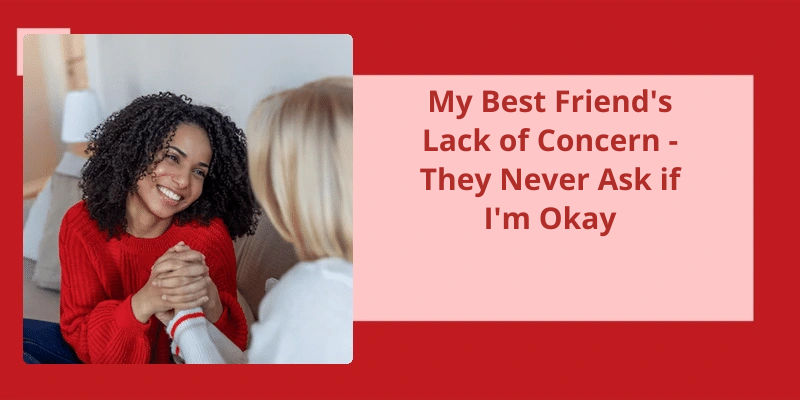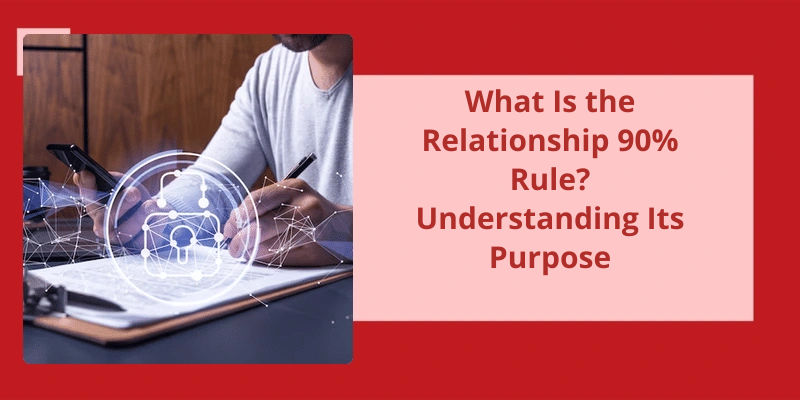When it comes to friendship, one of the most important aspects is the ability to truly care for and support one another. A good friend is there through thick and thin, always willing to lend an ear or a shoulder to cry on. However, not all friendships are created equal, and sometimes we find ourselves in situations where our closest companions don't seem to demonstrate the same level of concern for our wellbeing. Such is the case with my best friend – despite our years of camaraderie and shared experiences, she never seems to ask if I'm okay. At first, I tried not to read too much into it, thinking that maybe she assumed I was doing well or that I’d reach out if I needed help. But as time went on, the lack of acknowledgement began to weigh on me and make me question the depth of our friendship. Why doesn't she care enough to check in? Is it me? Or is it just a part of who she is? These are the questions that have plagued me, and while I don't have all the answers, I do know that it’s made me appreciate the friends who do ask how I'm doing all the more.
How Do You Ask a Friend if They Are OK Over Text?
Asking a friend if they’re okay can be difficult, especially over text. You want to make sure that your message conveys genuine concern and support, without being too invasive. A good way to start is with a casual greeting, like “Hey” or “Hi there”, followed by a statement that lets them know youve been thinking about them. This can help ease into the conversation and show that youre not just checking in for the sake of it.
Once youve acknowledged your friend and expressed your concern, it’s important to be direct and ask if theyre okay. You might say something like “I just wanted to check in and see how youre doing. Is everything okay?” or “Youve been on my mind lately, and I wanted to make sure youre doing alright. How are you feeling?”. Make sure to give your friend room to respond in whatever way feels comfortable to them, whether thats through text or a phone call.
It’s also important to let your friend know that youre there for them if they want to talk. You might say something like “If you need someone to talk to, Im here for you. Dont hesitate to reach out if you need anything.”. This can help your friend feel supported and comforted, knowing that they’ve someone they can turn to if they need it.
If your friend does express that they’re struggling or going through a tough time, it’s important to listen to them without judgement. Let them know that their feelings are valid and that youre there to support them through whatever theyre going through. You might say something like “Im so sorry to hear that. That sounds really tough. Is there anything I can do to help?” or “Thank you for sharing that with me. I know it can be hard to talk about these things, and Im here for you.”
Lastly, it’s important to check in on your friend periodically, especially if they’re going through a difficult time. Let them know that youre thinking of them and that you care about their well-being. You might say something like “Just wanted to say hi and check in on you. How are you doing today?” or “Thinking of you and sending you positive thoughts. Let me know if theres anything I can do to help.”. Remember that checking in on your friend doesn’t have to be complicated or overly involved. Even a simple message can go a long way towards showing that you care.
How to Identify Signs That Your Friend May Not Be Okay
- They avoid social situations or cancel plans without explanation
- They seem constantly tired or lack energy
- They express feelings of hopelessness or helplessness
- They’ve trouble sleeping or sleep excessively
- They’ve difficulty concentrating or making decisions
- They talk about feeling worthless or guilty
- They engage in reckless behavior or substance abuse
- They withdraw from friends and family
- They express thoughts of self-harm or suicide
- They exhibit a significant change in mood or behavior
It’s important to check on our friends and loved ones, especially during difficult times. However, there’s a delicate balance between showing genuine care and unintentionally causing harm with our words. As psychologist Dr. Joy Harden Bradford explains, asking if someone is OK can be perceived negatively without proper communication and reassurance. So, it’s important to approach the conversation with empathy and a clear intention to help.
Is It Weird to Ask a Friend if They Are Ok?
When it comes to asking a friend if they’re OK, there’s no definitive answer. It really depends on the situation and the type of relationship you’ve with your friend. In some cases, asking if someone is OK can be seen as intrusive or pushy, especially if the friend is going through a difficult time. However, in other cases, asking if someone is OK can show that you care and are willing to help.
In general, it’s a good idea to approach the question with empathy and humility. Acknowledge the fact that your friend may be going through a tough time, and that youre there to support them if they need it. Try to avoid making assumptions about their situation or telling them what to do. Instead, listen to their concerns and be open to whatever they’ve to say.
It’s also important to recognize that some people may not be comfortable talking about their feelings or admitting that theyre struggling. If your friend seems hesitant or resistant to your question, don’t push them. Instead, let them know that youre available if they need to talk and that you care about them. Ultimately, the decision to share their feelings is up to them.
However, it’s important to approach the question with sensitivity and respect. By listening to your friend and being supportive, you can create a safe space for them to open up if they need to. And remember, it’s OK if they don’t feel comfortable sharing right away – just knowing that youre there for them can make a big difference.
How to Recognize Signs of Mental Health Issues in a Friend
To recognize signs of mental health issues in a friend, observe changes in their behavior, mood, and habits. Look for persistent sadness, anxiety, irritability, and changes in sleep patterns or appetite. Increase in substance abuse, reckless behavior, and social withdrawal may also be indicators of mental health issues. It’s important to approach your friend with empathy and offer support, while encouraging them to seek professional help from a mental health expert.
Conclusion
In conclusion, having a best friend who never asks if you’re okay can be understandably difficult, especially when you may be going through tough and challenging times. It's important to recognize that everyone has their own communication styles, and some individuals may not be accustomed to checking in on others regularly. However, in a true friendship, both parties should feel comfortable expressing their emotions and checking in on each other's well-being. If your best friend never asks if you're okay, it may be worth having an open and honest conversation with them about the importance of emotional support in your friendship.






